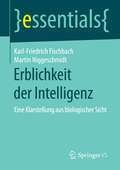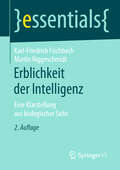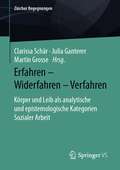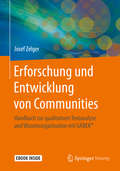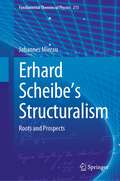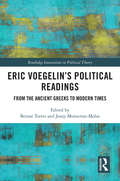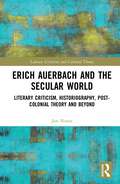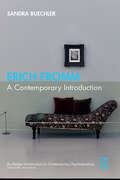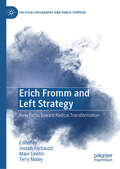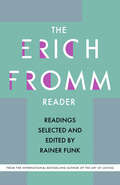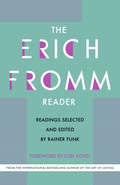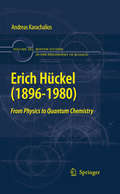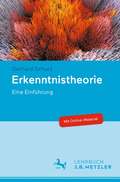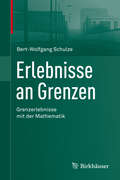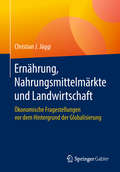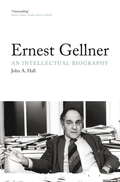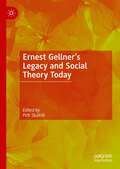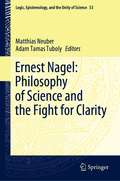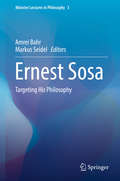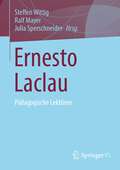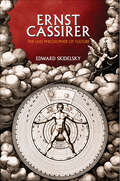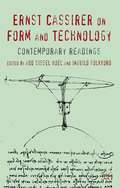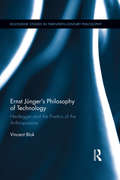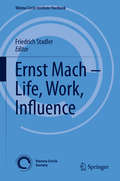- Table View
- List View
Erblichkeit der Intelligenz: Eine Klarstellung aus biologischer Sicht (essentials)
by Karl-Friedrich Fischbach Martin NiggeschmidtDieses Kompendium greift ein umstrittenes Thema auf: Ist Intelligenz erblich? Bei der Beantwortung dieser Frage geraten selbst Fachleute ins Schwimmen. Schuld daran sind missverständliche Fachbegriffe und überzogene Vorstellungen von der Aussagekraft des in der Intelligenzforschung genutzten Erblichkeitsmodells. Karl-Friedrich Fischbach und Martin Niggeschmidt erläutern das Modell aus Sicht der Biologie - jenes Wissenschaftsbereichs also, in dem es ursprünglich entwickelt wurde. Wer sich die Logik des Modells vergegenwärtigt, stellt fest: Intelligenz als ,,erblich" zu bezeichnen, ist unpräzise und irreführend.
Erblichkeit der Intelligenz: Eine Klarstellung aus biologischer Sicht (essentials)
by Karl-Friedrich Fischbach Martin NiggeschmidtIst Intelligenz erblich? Karl-Friedrich Fischbach und Martin Niggeschmidt zeigen, dass „Erblichkeit“ in der biologischen Fachsprache etwas anderes bedeutet als in der Alltagssprache – was fast zwangsläufig zu Fehlinterpretationen führt. Die 2. Auflage dieses essentials wurde um Kapitel zur Aussagekraft von Zwillingsstudien und genomweiten Assoziationsstudien über IQ-Unterschiede erweitert. Wer sich die Logik der Modelle und Methoden vergegenwärtigt, stellt fest: Intelligenz als „erblich“ zu bezeichnen, ist unpräzise und irreführend. Die Autoren:Prof. Dr. Karl-Friedrich Fischbach ist Entwicklungsbiologe und Neurogenetiker. Er war von 1985 bis 2013 Professor für Biophysik und Molekularbiologie an der Universität Freiburg, davon zwei Jahre lang als geschäftsführender Direktor des Instituts für Biologie III.Martin Niggeschmidt ist Redakteur in Hamburg.Stimmen zur 1. Auflage:„... Das zugänglich geschriebene Werk erklärt faktenbasiert und anhand zahlreicher Abbildungen den komplexen Stoff, um so Missverständnisse, aber auch bewusste Falschaussagen aufzudecken.” (Arne Baudach, in: Spektrum der Wissenschaft)„... wirklich lohnenswert, ja verdienstvoll ...“ (Joachim Müller-Jung, in: Planckton, Frankfurter Allgemeine Blogs)
Erfahren – Widerfahren – Verfahren: Körper und Leib als analytische und epistemologische Kategorien Sozialer Arbeit (Zürcher Begegnungen)
by Clarissa Schär Julia Ganterer Martin GrosseIn dem Band werden „Körper“ und „Leib“ als Analyse- und Erkenntniskonzepte sowohl auf das Handlungsfeld als auch das Theorie- und Forschungsfeld Soziale Arbeit bezogen. Zentraler Ausgangspunkt ist dabei, dass das Erfahren und das Widerfahren sozialpädagogischer Verfahren(-sweisen) an körperleibliches Wahrnehmen und körperleibliche Interaktionen aller beteiligten Akteur*innen rückgebunden sind. Es werden Zugänge präsentiert, die in unterschiedlicher Weise Aspekte von Körper und Leib in der Sozialen Arbeit als Praxis und Wissenschaft thematisieren und somit einen hybriden Diskussionsraum eröffnen.
Erforschung und Entwicklung von Communities: Handbuch zur qualitativen Textanalyse und Wissensorganisation mit GABEK®
by Josef ZelgerDieses Buch untersucht die Entwicklung von Communities mit Hilfe des GABEK®-Verfahrens Was hält Gemeinschaften zusammen? Diese Frage erforscht dieses Buch über die Entwicklung von Communities. Wichtiges Werkzeug ist dabei das Verfahren GABEK® (GAnzheitliche BEwältigung von Komplexität). Es analysiert u. a. Konzepte, Ontologien, Wertvorstellungen, Meinungen über Ursachen und Wirkungen sowie emotionale Einstellungen, die die Mitglieder einer Community verbinden. Durch eine softwareunterstützte Textanalyse werden sie in Form linguistischer Netze systematisiert. Diese Netze werden wiederum als Meinungslandkarten in unterschiedlichen Komplexitätsstufen dargestellt. Das Buch zeigt, wie Sie auf diese Weise Denk- und Handlungsmuster ableiten, die bei der Entwicklung von Communities oder auch bei der Organisationsentwicklung eine große Rolle spielen. Durch qualitative Textanalysen ermöglicht GABEK das Verständnis der Gesamtsituation und die Theoriebildung. Das Verfahren erleichtert die Konfliktlösung und eine Ausrichtung der Community auf strategische Ziele und Zukunftsvisionen, die von den meisten Betroffenen akzeptiert werden, auch wenn es um Erneuerung und Reformen geht.Theoretische Grundlagen werden mit Anwendungsbeispielen verknüpft Nach einer kurzen Beschreibung der qualitativen Methoden des GABEK-Verfahrens, untersucht dieses Buch die Entwicklung von Communities am Beispiel des Stadtteils Tepito in Mexico City. Anschließend befasst sich dieses Werk mit speziellen Themen, die mit der Gemeinschaftsbildung verbunden sind wie etwa:Sinn- und BedeutungszusammenhängeBegriffsanalysen durch BedeutungszusammenhängeVon Begriffsnetzen zu Ontologien durch KomplexitätsreduktionLinguistische GestaltbildungBewusste und unbewusste WissensverarbeitungProblemlösung durch den simulierten DialogUm die Entwicklung von Communities aufschlussreich zu untersuchen, liefert Ihnen dieses Buch neben theoretischen Grundlagen auch immer wieder konkrete Anwendungsbeispiele des Verfahrens GABEK, das Sie bei der Entscheidungsfindung und Organisationsentwicklung unterstützt. Abschließend beschreibt der Autor eine Zukunftsvision über die Entwicklung von Communities durch ein System der dynamischen Wissensorganisation. Auf diese Weise zeigt Ihnen dieses Werk mögliche Wege zu einer zukunftsorientierten Entwicklung von Organisationen, Gemeinden, Regionen oder Vereinen und Interessensgemeinschaften auf.
Erhard Scheibe's Structuralism: Roots and Prospects (Fundamental Theories of Physics #213)
by Johannes MierauThis book offers the first systematic review of the structuralism of physical theories. Particular emphasis is placed on the inclusion of empirical imprecision into formal reconstructions of theories. The proposed measure of imprecision allows for a topological comparison of theories. Considering the ongoing debates on the nature of the thermodynamic limit in statistical mechanics, as well as on limit relations between classical and quantum mechanics, the author asserts that the Bourbaki-style structuralism, together with E. Scheibe's theory of reduction, is the best choice for reconstructing and analyzing the related questions of reduction and emergence. Readers will appreciate the critical overview of the main positions in philosophy of science, examined with particular attention to their applicability to current problems of fundamental theories of physics.
Eric Drummond and his Legacies: The League of Nations and the Beginnings of Global Governance (Understanding Governance)
by David Macfadyen Michael D. Davies Marilyn Norah Carr John BurleyThis book shows how the first institution of global governance was conceived and operated. It provides a new assessment of its architect, Eric Drummond, the first Secretary-General of the League of Nations, appointed a century ago. The authors conclude that he stands in the front rank of the 12 men who have occupied the post of Secretary-General of the League or its successor, the UN. Part 1 describes his character and leadership. His influence in shaping the International Civil Service, the ‘beating heart’ of the League, is the subject of Part 2, which also shows how the young staff he appointed responded with imagination and creativity to the political, economic and social problems that followed World War I. Part 3 shows the influence of these early origins on today’s global organizations and the large scale absorption of League policies, programmes, practices and staff into the UN and its Specialized Agencies.
Eric Voegelin’s Political Readings: From the Ancient Greeks to Modern Times (Routledge Innovations in Political Theory)
by Bernat Torres and Josep MonserratEric Voegelin’s Political Readings fills a critical void by providing an original approach to studying the work of Eric Voegelin, one of the major political philosophers of the twenty-first century. Across six chapters, experts guide the reader from classical to modern times presenting six political philosophers who have had an impact on the life and philosophical production of Eric Voegelin. Philosophers examined include Plato, Aristotle, Saint Augustine, Hobbes, Weber and Kelsen. Through this innovative structure, the chapters collectively illustrate how Voegelin was an exceptional thinker through his engagement with political philosophers both modern and antique. The plurality of unique, academic perspectives and voices enriches our understanding of Voegelin’s own thought while also encouraging a re-think of ancient and modern thinkers, and the transformation and continuity between these. Designed for students and scholars alike, Eric Voegelin’s Political Readings will appeal to all those with an interest in Voegelin as well as readers familiar with classical and modern political philosophers.
Erich Auerbach and the Secular World: Literary Criticism, Historiography, Post-Colonial Theory and Beyond (Literary Criticism and Cultural Theory)
by Jon NixonAuerbach was one of the foremost literary critics of the 20th century whose work has relevance within the fields of literary criticism, historiography and postcolonial theory. The opening chapter of this book explains how he understood the task of interpretation and his role as an interpreter. The following chapter outlines the important phases in his life with reference to the writers and thinkers who influenced him in his thinking and practice. The central chapters of the book focus on specific themes in his work: the historical grounding of the ‘figural’ imagination; the relation between the secular and the sacred; the emergence of tragic realism; and the notion of ‘inner history’ as a defining feature of early 20th-cenntury modernism. The final two chapters focus on broader issues relating to the development of Auerbach’s understanding of the development of an educated readership within Europe and of his concerns regarding the emergence of what he terms ‘a world literature’.
Erich Fromm: A Contemporary Introduction (Routledge Introductions to Contemporary Psychoanalysis)
by Sandra BuechlerIn this passionate volume, Sandra Buechler introduces Erich Fromm's groundbreaking contributions to psychoanalysis, sociology, philosophy, political action, and social criticism. | Buechler explores how Fromm's thinking and interdisciplinary vision are able to frame discussions of dilemmas in contemporary society. She offers a comprehensive biography of Fromm, before delving into his role as analyst, author, activist, sociologist and philosopher. From her own experience as a psychoanalyst, and from the testimony of Fromm's many ardent followers, Buechler illuminates Fromm's capacity to inspire. She considers how Fromm's writing equips students, beginning clinicians and more experienced professionals to understand what can give meaning to their efforts on behalf of troubled individuals, their riven communities, and the wider world. | Assuming no prior knowledge of Fromm's work, this books offers students in clinical and social psychology, sociology, and philosophy a vital insight into his theoretical contributions. It will also be of interest to psychoanalysts, psychologists and social workers.
Erich Fromm and Left Strategy: New Paths Toward Radical Transformation (Political Philosophy and Public Purpose)
by Terry Maley Joseph Fantauzzi Maor LevitinThis book considers the work of Erich Fromm as it can be applied to radical Left political strategy. It aims primarily to demonstrate the relevance of his ideas to contemporary radical Left strategy and to contribute to the revitalization of critical social theory and its relationship to radical praxis. Specifically, the case is made throughout this volume that Fromm’s humanist socialism offers a unique set of critical tools for impugning entrenched assumptions and ossified debates within the contemporary radical Left about what struggles against capitalist exploitation and myriad interconnected social oppressions can and should look like. Four vantage points are identified and explored to this end. The first focuses on the question of what Fromm’s theoretical contributions can teach us about what radical activism and resistance ought to look like across multiple terrains of struggle. The second asks what Fromm’s insights regarding social character can teach us about the forces that stifle productiveness and reproduce domination. In a more utopian vein, it asks what society might look like once domination has been eliminated. The third places Fromm in dialogue with diverse voices on the Left, including prominent psychoanalysts and social and political theorists, with an eye toward lingering tensions and disagreements about radical social change. The fourth asks why the Right has gained ground politically in recent years and what can be done to contain it, and offers psychoanalytically inflected reflections on the pernicious effects of group narcissism on individuals’ political agency.
The Erich Fromm Reader: Readings Selected and Edited by Rainer Funk
by Erich Fromm&“Fromm crossed the boundaries of traditional disciplines to expound his view on the alienation of man in an increasingly technological world.&” —Newsweek Erich Fromm&’s basic idea was to look at the individual as a social being, and to look at society as an ensemble of many individuals who have not only mutual ideas and convictions based on a common practice of life, but also a shared psychic structure. With his concept of &“social character,&” Fromm created a new interdisciplinary thinking presented in this compendium.The Erich Fromm Reader exhibits the true genius of an original thinker in seeing the connections between overlapping knowledge from many different fields. Here, interdisciplinarity is not only a lip service but the impact of Erich Fromm&’s unique social psychological notion.
The Erich Fromm Reader
by Erich Fromm Rainer Funk Joel KovelFromm's basic idea was to look at the individual as a social being and to look at society as an ensemble of many individuals who have not only common ideas and convictions based on a common practice of life but also a common psychic structure. With his concept of "social character" he created a new interdisciplinary thinking presented in this reader. The Erich Fromm Reader exhibits the true genius of an original thinker in seeing the connections between overlapping knowledge from many different fields. Here interdisciplinarity is not only a lip service but the impact of Erich Fromm's unique social psychological notion.
Erich Hückel (1896-1980)
by Andreas KarachaliosThis study, the first comprehensive account of Erich Hückel's career, examines his scientific work as well as his importance for the emergence of quantum chemistry as an independent discipline in Germany during the 1930s. Hückel began his career by studying quantum physics in Göttingen, but his background in chemistry led him to take up pioneering research on the physics of chemical bonding. Drawing on a variety of sources, Andreas Karachalios offers a probing account of fast-breaking developments in quantum theory that paved the way for Hückel's research. In Göttingen and later in Leipzig, Hückel interacted with leading figures not only in quantum physics and physical chemistry but also with others in nearby fields, including organic chemistry and mathematics. During his later career in Marburg, Hückel clashed with Linus Pauling over the properties of the benzine molecule. In order to appreciate this controversy, Karachalios gives a brief account of the mathematical formalism of spin invariants, with both Hückel and Pauling used in their analyses, though with different interpretations. This serves not only to clarify their differences but also to illustrate the importance of the quantum-mechanical theory of resonance for chemistry at this time.
Erkenntnistheorie: Eine Einführung
by Gerhard SchurzDas Lehrbuch führt voraussetzungsfrei in alle bedeutenden Gebiete der Erkenntnistheorie ein. Es stellt eine Mitte zwischen der zeitgenössischen angelsächsischen Epistemologie und den klassischen Fragen der Erkenntnistheorie her und schlägt auch Brücken zu Nachbardisziplinen. Im letzten Teil wird gezeigt, wie mit den erarbeiteten Methoden grundlegende erkenntnistheoretische Rätsel, wie das Induktionsproblem und das Realismusproblem, aufgelöst werden können. Jedes Kapitel entspricht einer grundlegenden Lehreinheit, die durch Hinzunahme der Exkurse zu einer umfassenderen Einführung erweitert werden können.
Erlebnisse an Grenzen - Grenzerlebnisse mit der Mathematik
by Bert-Wolfgang SchulzeDie innerdeutsche Grenze verlief nicht nur zwischen zwei Staaten, sondern spiegelte sich sogar in den Grundlagenwissenschaften wie der Mathematik wider. Aus persönlicher Sicht zeigt der Autor den subjektiven Umgang mit Erzeugung, Bewertung und Propagierung wissenschaftlicher Resultate in den zwei unterschiedlichen Gesellschaftssystemen. Auf unterhaltsame Art werden Innensichten aus Forschungsinstitutionen, der Wissenschaftsförderung und die verschiedenen Einstellungen zur Zweckbestimmung reiner und angewandter Forschung dargelegt.
Ernährung, Nahrungsmittelmärkte und Landwirtschaft
by Christian J. JäggiErnährung wird heute vor allem unter ernährungstechnischen, medizinisch-gesundheitlichen oder weltanschaulichen Aspekten (z.B. Vegetarianismus, Veganismus usw.) diskutiert. Obwohl die Nahrungsmittelindustrie einen der wichtigsten Märkte darstellt, werden Fragen der Nahrungsmittelproduktion, der Landwirtschaft, des Nahrungsmittelhandels und der Biodiversität meist unter nationalen Vorzeichen diskutiert. Nicht nur auf Produzentenseite, sondern auch aus der Sicht der Konsumenten sind die Nahrungsmittelmärkte – obwohl immer noch national strukturiert – mehr und mehr zu globalen Märkten geworden, was sich etwa in der Entwicklung der Nahrungsmittelrohstoffpreise zeigt. Dazu kommt, dass große Nahrungsmittelkonzerne die Strategie verfolgen, die gesamten Wertschöpfungsketten im Landwirtschafts- und Nahrungsmittelbereich zu vereinheitlichen – wohlgemerkt unter ihrer Kontrolle. Das Buch thematisiert ökonomische Fragen zur Nahrungsmittelproduktion, zur Landwirtschaft, zum Handel mit Nahrungsmitteln und zur Biodiversität. Dabei werden Alternativen zur traditionellen Landwirtschaft, zur Massentierhaltung, zum Verlust an biologischer Vielfalt diskutiert – und aus wirtschaftlicher Sicht reflektiert. Besonderes Augenmerk liegt dabei auf Aspekten der Globalisierung.
Ernest Gellner
by John A. HallErnest Gellner (1925-95) was a multilingual polymath and a public intellectual who set the agenda in the study of nationalism and the sociology of Islam. Having grown up in Paris, Prague, and England, he was also one of the last great Jewish thinkers from Central Europe to experience directly the impact of the Holocaust. His intellectual trajectory differed from that of similar thinkers, both in producing a highly integrated philosophy of modernity and in combining a respect for nationalism with an appreciation of the power of modern science. Gellner was a fierce opponent, in private as well as in public, of such contemporaries as Michael Oakeshott, Isaiah Berlin, Charles Taylor, Noam Chomsky and Edward Said. As this definitive biography shows, he was passionate in the defense of reason against every form of relativism--a battle that his intellectual inheritors continue to this day.
Ernest Gellner’s Legacy and Social Theory Today
by Petr SkalníkThis edited volume examines the critical issues of the 21st century through the prism of Ernest Gellner’s work. The contributors look critically at Gellner´s legacy, questioning whether he remains an inspiration for today’s social theorists. Chapters proactively probe Gellner’s thoughts on a variety of pressing topics—modernity, postcolonialsm, nationalism, and more—without losing sight of current debates on these issues. This volume further brings these debates to life by having each chapter followed by a comment by an academic peer of the chapter author, thus transforming the text into a lively and dynamic conversation.
Ernest Nagel: Philosophy of Science and the Fight for Clarity (Logic, Epistemology, and the Unity of Science #53)
by Matthias Neuber Adam Tamas TubolyThis volume is dedicated to the life and work of Ernest Nagel (1901-1985) counted among the influential twentieth-century philosophers of science. Forgotten by the history of philosophy of science community in recent years, this volume introduces Nagel’s philosophy to a new generation of readers and highlights the merits and originality of his works.Best known in the history of philosophy as a major American representative of logical empiricism with some pragmatist and naturalist leanings, Nagel’s interests and activities went beyond these limits. His career was marked with a strong and determined intention of harmonizing the European scientific worldview of logical empiricism and American naturalism/pragmatism. His most famous and systematic treatise on, The Structure of Science, appeared just one year before Thomas Kuhn’s even more renowned, The Structure of Scientific Revolutions. As a reflection of Nagel’s interdisciplinary work, the contributing authors’ articles are connected both historically and systematically. The volume will appeal to students mainly at the graduate level and academic scholars. Since the volume treats historical, philosophical, physical, social and general scientific questions, it will be of interest to historians and philosophers of science, epistemologists, social scientists, and anyone interested in the history of analytic philosophy and twentieth-century intellectual history.
Ernest Sosa
by Amrei Bahr Markus SeidelThis volume provides the reader with exclusive insights into Ernest Sosa's latest ideas as well as main aspects of his philosophical work of the last 50 years. Ernest Sosa, one of the most distinguished contemporary philosophers, is best known for his ground-breaking work in epistemology, and has also contributed greatly to metaphysics, metaphilosophy and philosophy of language. This book, resulting from the 18th Münster Lectures in Philosophy, includes an original article by Sosa on his most recent work in epistemology, and features an introduction to his philosophy as well as seven critical papers that target a wide range of topics from Sosa's oeuvre, as well as Sosa's responses. As regards his epistemology, the issues discussed include his solution of the sceptical problem in his most recent work and the question of how to integrate a sensible account of testimony to Sosa's virtue epistemology. The selected topics from his other fields of inquiry include his view on empirical challenges to human rationality, his defense of the scientific status of philosophy, his concept of causality as considered against the background of the current debate, his suggestion of a middle-way between existential relativism and absolutism and his externalistic internalism in the philosophy of mind and language.
Ernesto Laclau: Pädagogische Lektüren
by Ralf Mayer Steffen Wittig Julia SperschneiderDer Band diskutiert ausgewählte Positionen der Theoriebildung Ernesto Laclaus, die in den letzten Jahren im Kontext demokratietheoretischer Debatten zwar in politik-, kultur- und sozialwissenschaftlichen Feldern rezipiert wurde, deren Aufnahme in erziehungswissenschaftlichen Debatten aber eher als ‚handverlesen‘ bezeichnet werden könnte. Die Rezeption beschränkt sich häufig auf spezifische Einsätze rund um die gemeinsam mit Chantal Mouffe in Hegemonie und radikale Demokratie entwickelte und an Antonio Gramsci ansetzende Hegemonietheorie. Dass Laclaus Perspektiven jedoch eine Vielzahl produktiver Anschlüsse und Irritationen für unterschiedliche pädagogische Frage- und Problemstellungen beinhalten, verdeutlichen die hier versammelten Beiträge rund um transdisziplinäre Spannungsverhältnisse von Politik, Bildung und Pädagogik, von Artikulation und Repräsentation, von Ontologie und Identität oder im Kontext aktueller Sichtweisen auf Inklusion, Solidarität, Migration, pädagogische Beziehungen und Professionalität.
Ernst Cassirer: The Last Philosopher of Culture
by Edward SkidelskyThis is the first English-language intellectual biography of the German-Jewish philosopher Ernst Cassirer (1874-1945), a leading figure on the Weimar intellectual scene and one of the last and finest representatives of the liberal-idealist tradition. Edward Skidelsky traces the development of Cassirer's thought in its historical and intellectual setting. He presents Cassirer, the author of The Philosophy of Symbolic Forms, as a defender of the liberal ideal of culture in an increasingly fragmented world, and as someone who grappled with the opposing forces of scientific positivism and romantic vitalism. Cassirer's work can be seen, Skidelsky argues, as offering a potential resolution to the ongoing conflict between the "two cultures" of science and the humanities--and between the analytic and continental traditions in philosophy. The first comprehensive study of Cassirer in English in two decades, this book will be of great interest to analytic and continental philosophers, intellectual historians, political and cultural theorists, and historians of twentieth-century Germany.
Ernst Cassirer on Form and Technology
by Aud Sissel Hoel Ingvild FolkvordErnst Cassirer's thought-provoking essay Form and Technology (1930) ascribes to technology a new dignity as a genuine tool of the mind in equal company with language and art. Translated here into English it is accompanied by critical essays that explore its current relevance.
Ernst Jünger’s Philosophy of Technology: Heidegger and the Poetics of the Anthropocene (Routledge Studies in Twentieth-Century Philosophy)
by Vincent BlokThis book examines the work of Ernst Jünger and its effect on the development of Martin Heidegger’s influential philosophy of technology. Vincent Blok offers a unique treatment of Jünger’s philosophy and his conception of the age of technology, in which both world and man appear in terms of their functionality and efficiency. The primary objective of Jünger’s novels and essays is to make the transition from the totally mobilized world of the 20th century toward a world in which a new type of man represents the gestalt of the worker and is responsive to this new age. Blok proceeds to demonstrate Jünger’s influence on Heidegger’s analysis of the technological age in his later work, as well as Heidegger’s conceptions of will, work and gestalt at the beginning of the 1930s. At the same time, Blok evaluates Heidegger’s criticism of Jünger and provides a novel interpretation of the Jünger-Heidegger connection: that Jünger’s work in fact testifies to a transformation of our relationship to language and conceptualizes the future in terms of the Anthropocene. This book, which arrives alongside several new English-language translations of Jünger’s work, will interest scholars of 20th-century continental philosophy, Heidegger, and the history of philosophy of technology.
Ernst Mach – Life, Work, Influence (Vienna Circle Institute Yearbook #22)
by Friedrich StadlerThis edited volume features essays written in honor of Ernst Mach. It explores his life, work, and legacy. Readers will gain a better understanding of this natural scientist and scholar who made major contributions to physics, the philosophy of science, and physiological psychology. The essays offer a critical inventory of Mach’s lifework in line with state-of-the-art research and historiography. It begins with physics, where he paved the way for Einstein’s Theory of Relativity. The account continues with Mach's contributions in biology, psychology, and physiology pioneering with an empiricist and gestalthaft Analysis of Sensations. Readers will also discover how in the philosophy of science he served as a model for the Vienna Circle with the Ernst Mach Society as well as paved the way for an integrated history and theory of science. Indeed, his influence extends far beyond the natural sciences -- to the Vienna Medical School and psychoanalysis (R. Bárány, J. Breuer, S. Freud), to literature (Jung Wien, R. Musil), to politics (F. Adler, Austro-Marxism and the Viennese adult education), to arts between Futurism and Minimal Art as well as to social sciences between the liberal school (J. Schumpeter, F. A. von Hayek) and empirical social research (P. Lazarsfeld und M. Jahoda).
